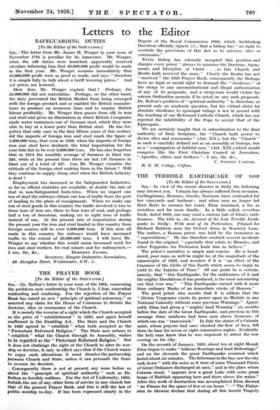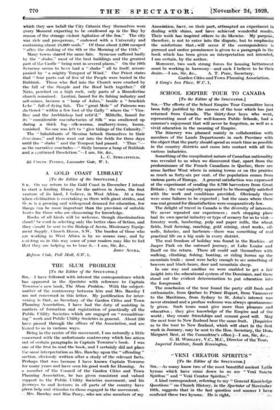THE TERRIBLE EARTHQUAKE OF 1693
[To the Editor of the SPECTATOR.] SIR,—In view of the recent disaster in Sicily the following may interest you. Catania has always suffered from invasion, Carthaginians, Romans, Greeks, Normans have contended for her vineyards and harbour ; and when men no longer led their fleets to menace her coast, Etna remained, a foe as resistless and far more deadly. In a little soiled, coverless book, dated 1693, one may read a curious tale of Etna's ruth- lessness. The title is, An Account of the Late Terrible Earth- quake in Sicily : With most of its Particulars. Printed for Richard Baldwin near the Oxford Arms in Warwick Lane. The author, a Roman priest, was held by the translator as " superstitious." He has therefore omitted several incidents found in the original, " especially that relate to Miracles, and other Fopperies his Profession leads him to believe."
The priest's narrative is simple and concise. He is bewil- dered, poor man, as well he might be, at the magnitude of the catastrophe of 1693, and wonders if it is " an effect of the Craziness of the Globe Of this Earth which seems to begin to yield to the Injuries of Time." Of one point he is certain, namely, that " this Earthquake, for the suddenness of it and the mighty Desolations it has produced, is the most astonishing one that ever was." " This Earthquake carried with it more than ordinary Marks of an immediate stroke of Heaven."
The good priest also asserts that it is seldom that the " Divine Vengeance exerts its power upon us Mortals in any National Calamity without some previous Warnings." Appar- ently Etna had given a " mighty loud Warning " six ,months before the date of the Great Earthquake, and previous to this message three rainbows had been seen above Syracuse, of which one was " tranversed." In July the statue of a Catania saint, whose prayers had once, checked the flow of lava, fell from its base for seven or eight consecutive nights. Evidently the holy man knew that he was impotent to arrest the woe coming On his city. On the seventh of January, 1693, about ten at night Mount Etna began to make " hideous Roofings and loud Bellowings," and on the eleventh the great Earthquake occurred which lasted about six minutes. The fishermen in the bay saw the city sink down " with the noise as it were of some Thousand Pieces of Great Ordnance discharged at once," and in the place where Catania stood, " appears now a great Lake with some 'great heaps of Rubbish appearing here and there above the water." After this work of destruction was accomplished Etna showed " no Flames for the space of five or six hours "--" Theirigher- then do likewise .declare that during ail this horrid Tragedy whit* they saw befall the -City Catania they themselves were cvery Moment expecting to be sWallOwed up in the -Bay 'by reason of the strange violent Agitation of the Sea." The city was rich' and prosperous; " endowed with a University and -containing about 24,000 souls." Of these about 2,000 escaped " after the shaking of the 9th or the Morning of the 11th."
Many towns shared the same fate. Syracuse suffered badly by the " shake," most of the best buildings and the greatest part of the Castle " being rent in several places." On the 10th Syracuse seems to have had a " shake " all to itself, accom- panied by " a mighty Tempest of Wind." Our Priest states that." four -parts- out of five of the People were buried in the Rubbish.- .• Those who fled into the Church were crushed by the -fall of the Steeple and the Roof -both together." Of Nato, perched on a high rock, only parts of a Benedictine church remained.- Lentini, famed for its-fishing industry and salt-mines,- became a " heap of Ashes," beside a " brackish Lake 7 .full of dying fish. The " great Mole"- of Palmero was shuttered within a few foot of-the Gaily " where the " Vice- Roy and the Archbishop had retir'd." Militello, famed for its " considerable manufactories -of Silk " was swallowed up during a thick fisg—silk-worms, mulberry-trees, loonis, vanished . No one was left. to " give tidings of the Calamity."
The " Inhabitants of -Messina hetook themselves. to their fitvetion_s," and, then went out into the fields for three. days until the " shake and the Tempest had passed. " Thus."— so the narrative. concludes—" Sicily.became a heap of Rubbish and a..ez,stinued Desolation."—I am, Sit, &o.,



















































 Previous page
Previous page